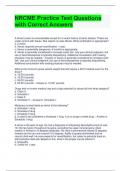Exam (elaborations)
NRCME Practice Test Questions with Correct Answers
- Course
- Institution
NRCME Practice Test Questions with Correct Answers A driver's exam is unremarkable except for a recent history of panic attacks. These are under control with Xanax. She reports no side effects. What certification is appropriate? a. 2 years. b. Xanax required annual recertification. 1 year....
[Show more]



